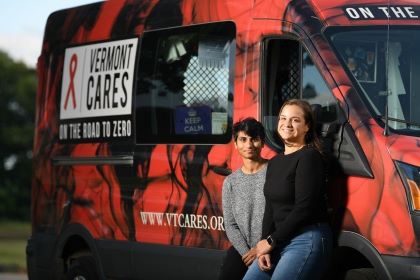Once a week, second-year medical students Noorin Damji and Kristina Valentine drive north to rural communities in Franklin County, Vt., in a well-stocked mobile outreach van to deliver free packs of sterile hypodermic syringes, fentanyl testing strips, and Narcan to people who inject drugs. This effort is known in public health as harm reduction.

Class of '22 medical students Noorin Damji, left, and Kristine Valentine, with the VT CARES mobile syringe van. (Photo: David Seaver)
Every Friday afternoon, Noorin Damji and Kristina Valentine, both second-year medical students at the University of Vermont's Larner College of Medicine, set off from campus to pick up the well-stocked mobile outreach van owned by a local nonprofit. Together, they drive north to rural communities in Franklin County, Vt., like Swanton, St. Albans, and Enosburg and deliver free packs of sterile hypodermic syringes, fentanyl testing strips, and Narcan to people who inject drugs.
This effort is known in public health as harm reduction. Damji and Valentine provide clients with access to tools and instruction aimed at reducing their risk of fatal overdose, as well as HIV, hepatitis C and other infections. Information about recovery programs is also available, but only if clients show an interest in receiving it.
“A super-important tenet of harm reduction is letting people choose their own level of intervention,” explains Damji, who learned an appreciation for “meeting people where they are” while volunteering for a similar program as an undergraduate at UC Berkeley. “The idea that people who inject drugs don’t care about their health just isn’t true. I think participating in harm reduction is our social responsibility as physicians.”
“We both want to be part of a new generation of physicians who are considered to be non-judgmental, aware and open,” adds Valentine.
Damji and Valentine, who are 2019-20 Schweitzer Fellows with the New Hampshire/Vermont Albert Schweitzer Fellowship chapter, are continuing a project launched in 2018 by Schweitzer Fellow for Life Katrina Thornburgh, now a third-year medical student at the Larner College of Medicine. Fellows receive a small stipend and conduct year-long projects that address the health needs of underserved populations and uphold the “Reverence for Life” philosophy made famous by physician, humanitarian and 1952 Nobel Peace Prize recipient Albert Schweitzer, M.D. Both the UVM Medical Center and Larner College of Medicine help fund the fellowships.
Thornburgh was interested in pursuing a harm reduction project with Vermont Committee for AIDS Resources, Education & Services (CARES). She conceived the idea to help expand and sustain the non-profit’s mobile syringe access service and, when her Fellowship ended, recruited Damji and Valentine to take over the effort. An internship is now in the works to involve additional Larner medical students when the current fellowship project ends.
Theresa Vezina, associate director of Vermont CARES, has played an essential role in the project as a community partner and mentor, making sure the students are competent and comfortable in their work. “Theresa has guided me through many mini-crises,” says Thornburgh. “From the time I couldn’t find the gas tank in the van and was out of gas somewhere in Enosburg, to when I had a difficult client encounter and she helped me find a way to rebuild trust in the client relationship.”
This year, Damji and Valentine see one or two clients per week from an overall caseload of about 30. Clients schedule appointments anonymously by calling a Vermont CARES number that is routed to the students’ cell phones via an app. The meetings are held in public places, like shopping center parking lots.
“We have a lot of clients who are younger men who are picking up supplies for themselves and their friends and partners,” says Damji. Clients are encouraged to take as many supplies as they need, and to take some more to share. About 85 percent of the syringes they distribute are returned for safe disposal.
“Overwhelmingly, people are super grateful. I’ve never had a bad experience with a client,” adds Valentine.
Vezina observes that fentanyl, an especially potent synthetic opioid, is a growing risk to drug users. Test strips only show whether fentanyl is present, but not how much. Vezina advises clients to proceed with caution. “Taste it first. Push the plunger on the syringe more slowly to gauge your body’s reaction. Maybe smoke or snort it instead of injecting it. Don’t use alone and have naloxone [Narcan] available.”
Some clients have made use of the service for five years or more, Vezina says. And that’s OK. This program is about helping people stay alive and as healthy as possible while they’re using drugs and, she adds, “We want to make sure they know that any time they’re into getting treatment they can let us know.”
Read more stories at "Confronting the Opioid Crisis: Stories of Partnership and Innovation in Treatment and Recovery from the UVM Health Network and Our Communities."